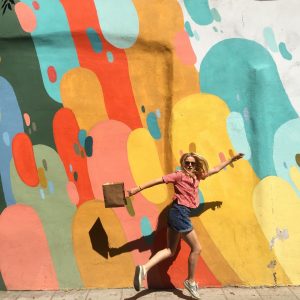Malikah Ullah, an undergraduate Psychology student, is currently completing a remote internship with South African non-profit, Ikamva Labantwana. She was awarded funding from Santander Universities to help cover the costs of her placement. Malikah is blogging about her experience of interning virtually – read part one below. Part two and three are available on Malikah’s blog.
Since June, I have been an intern at South Africa’s Ikamva Labantwana which means ‘our children’s future’ in Xhosa. As a centre for at-risk children, I identify with the beliefs of Ikamva strongly; especially on the importance of education. By providing local young people who are out-of-school or need support after-school with informative and practical modules, they allow students to keep learning and not be held back by geography or circumstance. Not only is Ikamva a learning space, it is a safe haven for kids and a productive use of their time.
This internship was organised by VACorps who worked swiftly to secure me an internship that suited my personality. I was looking for something that would involve people and helping people, which Ikamva focus on. It was a perfect match! Not only was internship a quick and easy match, I was supported by #SantanderUniUK who provided funding making sure finance didn’t put me off.
I think the opportunity to do a remote internship has been one positive to come from COVID (maybe the only good thing!). Due to travel restrictions, internships in South Africa’s townships have been made possible which were otherwise too rural to reach. Not only has working at Ikamva been rewarding, but I’ve learnt a ton about how to conduct research and make raw data and information both engaging and teachable. As a psychology student, this internship has allowed me real-life experience conducting research on sensitive subjects, including sexual violence, in order to create a final informative yet understanding piece which could be communicated to young girls. This is not unlike producing lab reports or communicating research products to the public as we do in my course.
A part of this research was attending a Zoom talk about how COVID-19 pandemic has disproportionately affecting women in Africa. It was hosted by Africa.com and attended by the awesome politician and humanitarian Graca Machel and philanthropist Melinda Gates. Both women had great ideas about how having a seat at the table on all levels of the government and policy-making boards will benefit all women up as they become a part of the decision-making process. This was actually an opportunity that was put on my radar by my supervisor at Ikamva; it was excellent to see how far women supporting women can get you.
For one of my tasks, I had the challenge of creating a life skills module just for girls aged 10-17 years old on issues that they felt were neglected in school including bullying, consent and having tangible female role models. I took this responsibility extremely seriously and worked hard to find black women who had done great work and changed all of our lives in some way – to which there were many! I wanted to select a few who could inspire the girls and show them that there is no limit to what they could do and become. One problem that the girls fed back was feeling underappreciated and having achievement go unrewarded. At Ikamva, they created an annual showcase for the girls’ work in response to this. This aptly sums up how Ikamva is there to help and develop the youth.
By working with such an ethos, it follows suit that the staff are lovely and very accommodating. It’s been nice to have prompt communication and feedback especially now that my first year at university has concluded. Keeping busy is also important since I have been shielding at home since March! In this sense, remotely interning in a country with a different society and other languages than mine has been a great opportunity that I definitely didn’t want to pass up.
Meetings via Zoom have posed their own challenges with timing differences and issues with connectivity, but it always works out in the end. Technology is really the thing that made this internship possible. I feel privileged to intern at a place that keeps in contact, check in on me and that provides proper support.
Maybe next year I will be in South Africa in person but for now, I’m super happy to work around my own schedule and I am enjoying working from home.
For part two and three, please visit Malikah’s blog.
